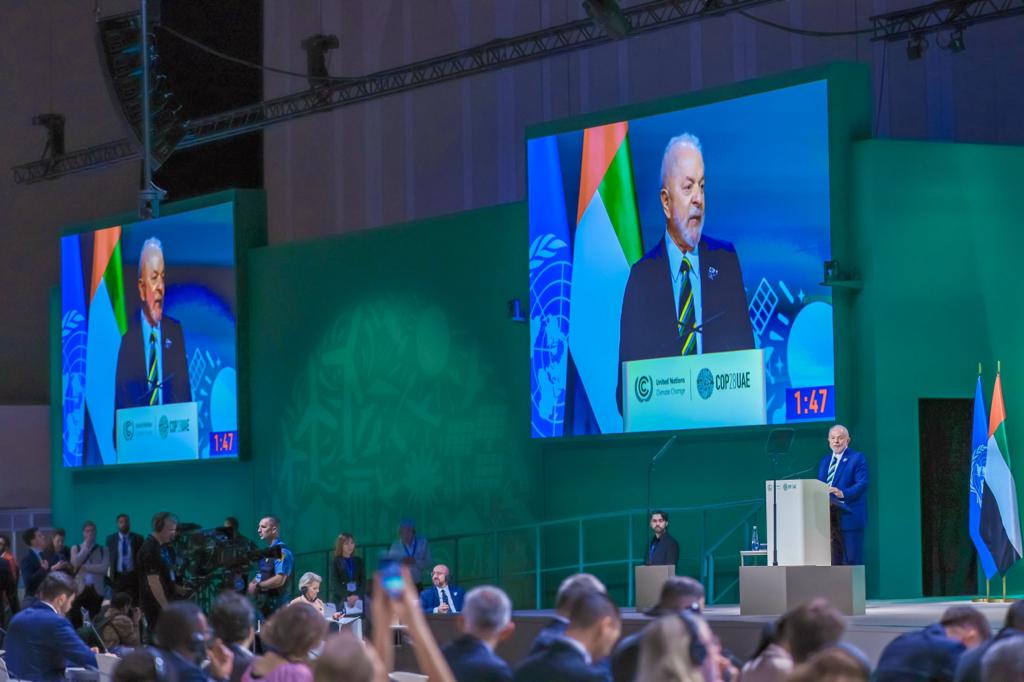Speech by President Lula at the First Session of the High-Level Segment for Heads of State and Government of COP 28

- President Lula speaking at the First Session of the High-Level Segment for Heads of State and Government of COP28
It is a big responsibility to be here in Dubai today.
We are facing what is perhaps the greatest challenge ever faced by humanity.
Instead of joining forces, the world is fighting wars, fueling divisions and deepening poverty and inequality.
The path from COP28 to COP30 in Brazil will dictate our future.
Here we will take stock of the Paris Agreement for the first time.
At COP29, we will define a new quantifiable financing objective.
And in Belem, we will formulate our new Nationally Determined Contributions (NDCs).
The latest IPCC report is categorical about the danger of an increase in global temperature of more than one and a half degree.
The Paris Agreement's goal of keeping global warming between one and a half and two degrees is already insufficient to contain it at a safe level.
We have a collective problem of inaction and another of lack of ambition.
The current NDCs are not being implemented at the expected pace.
And even if they were, they would not be able to keep the temperature below the one and a half degree limit.
Brazil adjusted its NDC and committed to reducing emissions by 48% by 2025 and 53% by 2030, as well as achieving climate neutrality by 2050.
Our NDC is more ambitious than that of several countries that have been polluting the atmosphere since the industrial revolution in the 19th century.
We remain firmly committed to zero deforestation in the Amazon by 2030.
We have already reduced it by almost 50% in the first 10 months of this year, which has prevented the emission of 250 million tons of carbon into the atmosphere.
But many countries in the Global South will not be able to implement their NDCs or take on more goals that are ambitious.
The most vulnerable must not have to choose between fighting climate change and fighting poverty. They will have to do both.
The principle of common but differentiated responsibilities is non-negotiable.
Threatening it goes against any basic notion of climate justice.
This notion demands that financing and technology transfer obligations be fulfilled.
It is unacceptable that the promise of 100 billion dollars a year made by the developed countries will not come to fruition while, in 2021 alone, military spending reached 2 trillion and 200 billion dollars.
In Brazil, the climate emergency is already a reality.
The Amazon is currently experiencing an unprecedented drought.
River levels are at their lowest for more than 120 years.
I never imagined that I would see this in the place where the world's largest freshwater reservoirs are located.
But the future of the Amazon does not only depends on the Amazonians.
Deforestation worldwide only corresponds to 10% of global emissions.
Even if we do not cut down any more trees, the Amazon could reach its point of no return if other countries do not do their part.
The rise in global temperatures could trigger an irreversible process of savannization of the Amazon.
The energy, industry and transport sectors emit many greenhouse gases.
We have to deal with all of these sources.
That is why Brazil is proposing Mission 1.5 - a collective mission that will keep us on the one-and-a-half degree track.
In the two years until COP30, we will need to redouble our efforts to implement the NDCs we have assumed.
And in Belem, we need to announce bolder NDCs and guarantee the means of implementation needed to make them a reality.
Developing countries require positive incentives to promote climate action measures in line with their development priorities.
Indigenous mythology says that the Amazon River was born from the tears of the moon.
The Moon had to give up its love for the Sun so that the heat would not destroy the Earth.
If we do not put our differences aside in the name of a greater cause, life on the planet will be in danger. And it will be too late to cry.
Thank you very much.